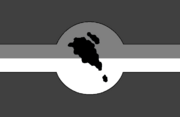Sotigabon
This article is incomplete because it is pending further input from participants, or it is a work-in-progress by one author. Please comment on this article's talk page to share your input, comments and questions. Note: To contribute to this article, you may need to seek help from the author(s) of this page. |
| Native name: Şotīgābon Nickname: Stone Bay | |
|---|---|
 Şotīgābon Flag | |
| Geography | |
| Location | Sunadic Ocean |
| Archipelago | Oceanic Islands |
| Total islands | 3 |
| Major islands | Sotigabon Dilebon Lepo |
| Administration | |
| Sotigabon | 96,500+ |
| Dilebon | 13,000+ |
| Lepo | 10,000+ |
| Capital and largest | Bojva (pop. 56,300+) |
| Jonn Poged | |
| Demographics | |
| Demonym | Sotigabonese |
| Population | 125,458 (2018) |
| Languages | Sotigabonese Northern Ivili |
| Ethnic groups | |
| Additional information | |
| Time zone |
|
| • Summer (DST) |
|
The Şotīgābon archipelago is a dependent territory of the Kingdom of Flatstone, originally a colony established in 1270 by Ejek Von Stone, the Şotīgābon would earn the status of dependent territory after a bloody failed revolution in 1912 at the infamous Fort Kīto, a military installation converted for use as a prison, that would result in the rise of Şotīgābonese nationalism and the unrecognized declaration of the Şotīgābonese Pirate Republic, a short-lived micronation that aimed to secede from Flatstone and establish an independent government. These plans would be thwarted after the Fort Kīto massacre, conducted by the Stonish navy and members of the Posukoşoti, in which the prison was bombarded by Stonish naval batteries. The island chain would remain under the control of the monarchy until it's removal, when it was replaced by the republican government in the 1960's. During this period, Şotīgābon would enjoy a certain degree of autonomy and civil liberties, including the first federal recognition of the Şotīgābonese tricolor, the flag that had been raised by the escapees that had participated in the rebellion of 1912. This flag would remain the official flag of Şotīgābon until the republican governments removal in 2008, when the rebel flag would be outlawed for a short period of three months, being replaced by a federal pro-irredentist flag shortly after. The rebel flag would lose it's illegal status after the three month period.